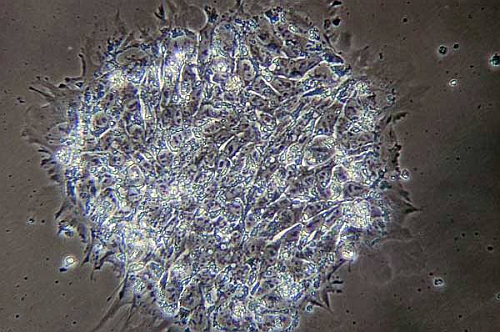24 August 2015. A grant from National Institute of Allergy and Infectious Diseases is funding preclinical research by a biotechnology company on stem cells as a therapy for a type of lupus. The $225,000 grant from NIAID, part of National Institutes of Health, is made to Ocata Therapeutics Inc. of Marlborough, Massachusetts under the institute’s Small Business Innovation Research program that sets aside a portion of its research funds for smaller enterprises.
Systemic lupus erythematosus, commonly known as lupus, is an autoimmune disease, where the immune system is tricked into attacking healthy tissue and cells, in this case leading to inflammation in the joints, skin, and other organs including heart, lungs, and kidneys. The disorder is more common in women than men, mainly affecting individuals between the ages of 10 and 50.
The research by Ocata Therapeutics funded by the grant looks particularly at inflammation of the kidneys among lupus patients, known as lupus nephritis that affects up to 6 in 10 people with lupus and can lead to serious illness and death. The company notes that a subset of patients with lupus do not respond to conventional therapies for managing the disease, where remission of lupus nephritis is slow and treatment options are limited.
Ocata develops regenerative therapies from stem cells, and up to now concentrated largely on stem cell treatments for eye diseases including Stargardt’s disease, dry age-related macular degeneration, myopic macular degeneration, and retinitis pigmentosa. The company’s therapies for Stargardt’s disease, dry age-related macular degeneration, and myopic macular degeneration are currently in clinical trials.
The NIAID grant supports Ocata’s research on developing stem cells to treat lupus and lupus nephritis. Ocata proposes testing transplanted mesenchymal stromal cells derived from human embryonic stem cells in lab mice induced with lupus. Mesenchymal stromal cells are considered good candidates since they can transform into various types of cells and suppress immune responses. In previous attempts, however, these cells have not shown enough stability or consistency when multiplied into therapeutic-scale quantities in the lab.
Ocata says its technology platform based on human embryonic stem cells produces unlimited, replenishable quantities of these therapeutic cells, and has tested the cells in the lab with autoimmune disease models including lupus. The new study will test Ocata’s technology with mice induced with lupus nephritis resulting from different underlying genetic sources. The grant also includes tests with stem cells derived from umbilical cord blood, an alternative to embryonic stem cells.
Small Business Innovation Research grants support early stage research by smaller companies, with U.S. science agencies setting aside a portion of their research funds for these grants. In the current fiscal year, NIH expects to spend $780 million on SBIR and related Small Business Technology Transfer grants. The new funding for Ocata is a phase 1 or early-stage project to prove the concept, in this case preclinical tests of the proposed therapy.
Read more:
- Robotics Harnessed to Produce Adult Stem Cells
- Trial Shows Engineered T-Cells Act on Multiple Myeloma
- Stem Cells Treat Vision Disorders in Animal Tests
- Stem Cell Biotech Gains $44M in First Venture Round
- Biotechs Partner on Cancer Stem Cell-Gene Therapies
* * *


 RSS - Posts
RSS - Posts
You must be logged in to post a comment.